Module 8 Time off Unit 1 课件(共27张ppt) 外研版八年级下册
文档属性
| 名称 | Module 8 Time off Unit 1 课件(共27张ppt) 外研版八年级下册 |
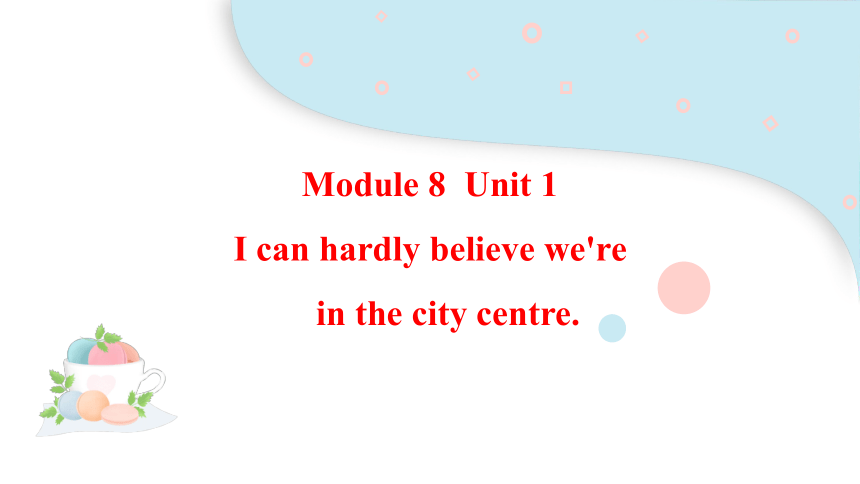
|
|
| 格式 | pptx | ||
| 文件大小 | 25.0MB | ||
| 资源类型 | 教案 | ||
| 版本资源 | 外研版 | ||
| 科目 | 英语 | ||
| 更新时间 | 2024-11-23 17:36:12 | ||
图片预览


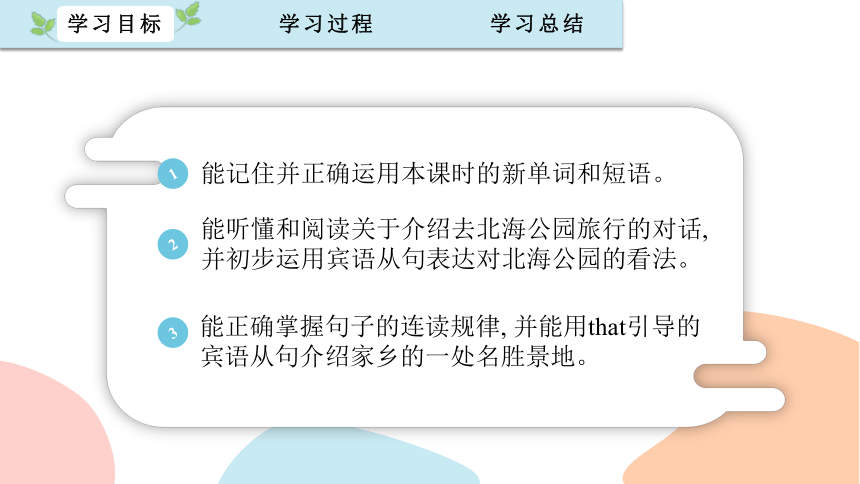

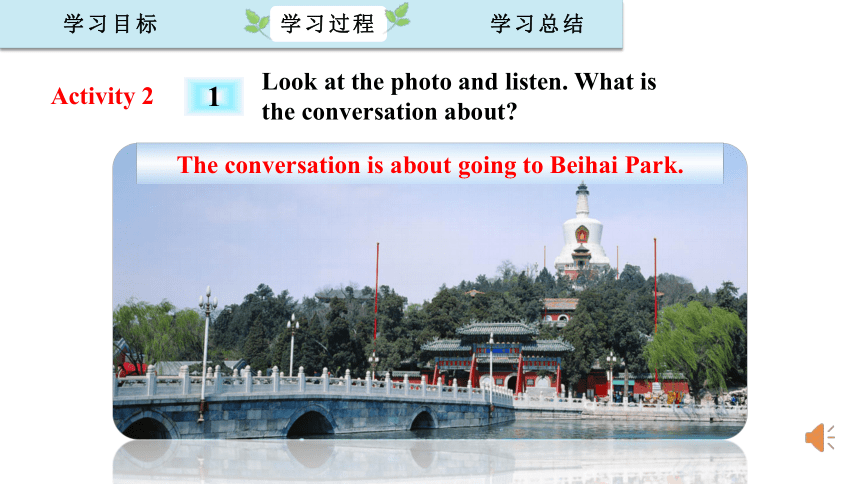

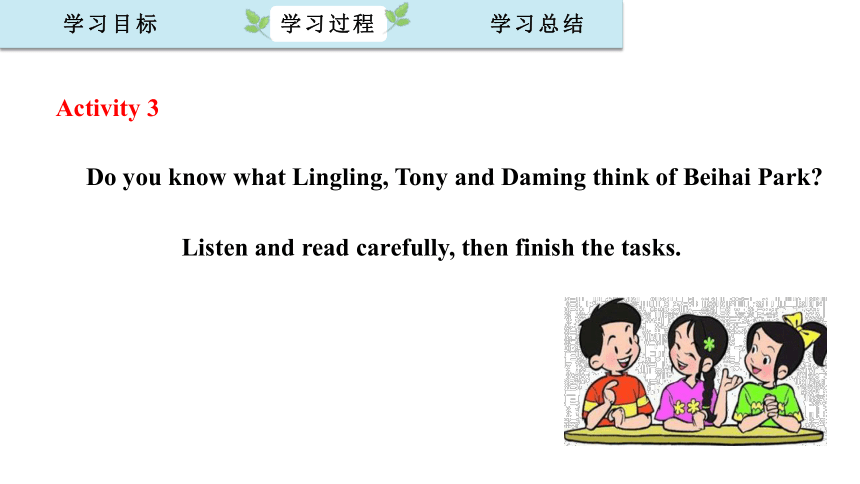
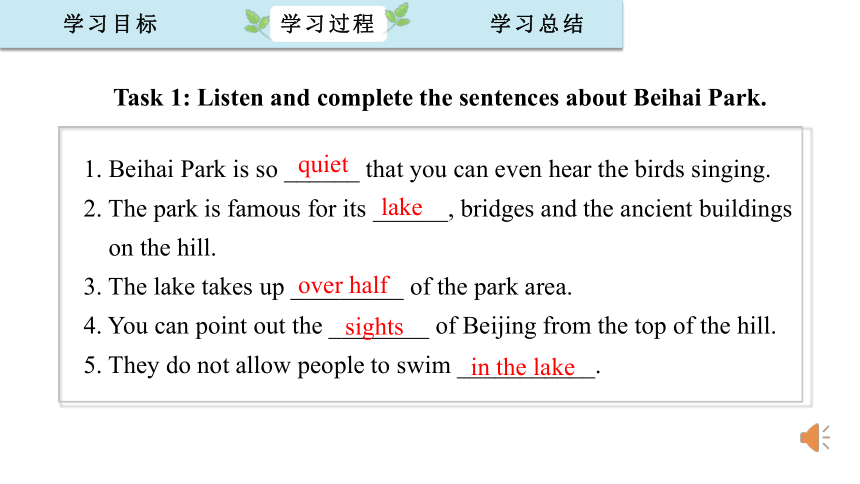
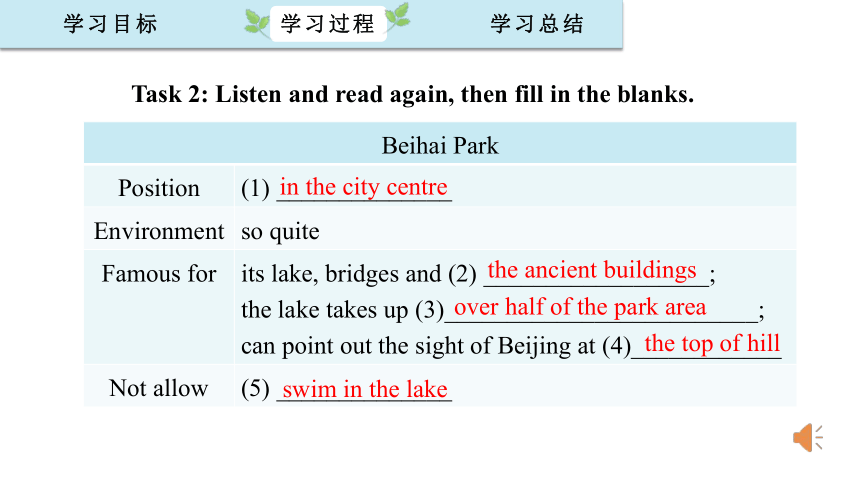
文档简介
(共27张PPT)
Module 8 Unit 1
I can hardly believe we're
in the city centre.
Do you like to travel Where do you want to go
Take your money and go with me. Let’s go on a journey!
1
2
能记住并正确运用本课时的新单词和短语。
3
能听懂和阅读关于介绍去北海公园旅行的对话, 并初步运用宾语从句表达对北海公园的看法。
能正确掌握句子的连读规律, 并能用that引导的宾语从句介绍家乡的一处名胜景地。
目标一:听懂和阅读关于介绍去北海公园旅行的对话, 并初步运用宾语从句表达对北海公园的看法
Activity 1
Let’s go to Beijing — Places of interest in Beijing
The Great Wall
Tian’an men Square
the Palace Museum
Beihai Park
Temple Of Heaven
Welcome to Beihai Park
Activity 2
1
Look at the photo and listen. What is the conversation about
The conversation is about going to Beihai Park.
2
Listen again and choose the correct answer.
1. Tony has / hasn't heard about Beihai Park.
2. Tony guesses that the park is very popular / not very popular.
3. Lingling suggests that they spend the day there / Daming and
Betty come too.
4. Lingling thinks / doesn't think the park will be busy.
Activity 3
Do you know what Lingling, Tony and Daming think of Beihai Park
Listen and read carefully, then finish the tasks.
Task 1: Listen and complete the sentences about Beihai Park.
1. Beihai Park is so ______ that you can even hear the birds singing.
2. The park is famous for its ______, bridges and the ancient buildings
on the hill.
3. The lake takes up _________ of the park area.
4. You can point out the ________ of Beijing from the top of the hill.
5. They do not allow people to swim ___________.
quiet
lake
over half
sights
in the lake
Task 2: Listen and read again, then fill in the blanks.
Beihai Park Position (1) ______________
Environment so quite
Famous for its lake, bridges and (2) __________________;
the lake takes up (3)_________________________; can point out the sight of Beijing at (4)____________
Not allow (5) ______________
in the city centre
the ancient buildings
over half of the park area
the top of hill
swim in the lake
Task 3: Read and repeat.
找出对话中表示看法或观点的句子
并分析句子结构特征?
Everyday English
Here we are.
Wow!
I can hardly believe…
That’s too bad.
Come on!
it’ll be fantastic to see the city from the top
they can go for a swim.
they don’t allow people to swim in the lake.
Tony
Lingling
Daming
thinks/
suggests
主语
谓语
宾语从句即指在主从复合句中用作宾语的句子。
通常放在believe,be sure,think,hope等动词后做宾语。
宾语
主句
宾语从句
Task 4: Read the sentences and answer the questions.
1.“I can hardly believe we’re in the city centre.”
Does Tony know they are in the city centre or not
2.“Then I can point out the sights of Beijing for you.”
Does Lingling want them to look at something or listen to something
3. “I’m so hungry and thirsty.”
Does Daming want something to drink
4. “Let’s not waste any more time.”
Does Tony think they are spending their time well or badly
Tony doesn’t know they are in the city centre.
Lingling wants them to look at something.
Yes, he does.
Tony thinks they are spending their time badly.
hardly, sights,
thirsty, waste
Activity 4
Work in groups. Find out some language points that you think are important and share their use with your classmates and give some examples.
Language points:_______________________
_____________________________________
_____________________________________
____________________________________
_____________________________
Language points
(1) so... that...意为“如此……以至于……”, 可以用来引导
结果状语从句。so后面跟形容词或副词的原级, that后
接从句。
e.g. It's so hot that I can't sleep. 天如此热,我无法睡觉。
1. It's so quiet here that I can even hear the birds singing!
【拓展】
①so后面还可接其他结构: so+adj.+a/an+单数可数名词;so+/much/little+不可数名词或so+many/few+可数名词复数。
e.g. He is so famous an actor that a lot of people know him.
②such...that...如此……以至于…… such修饰名词,其后的结构可以为: such+a/an+adj.+可数名词单数;such+adj.+不可数名词/可数名词复数。
e.g. They are such good teachers that all the students like them.
2. I can hardly believe we’re in the city centre.
hardly adv. 意思是“几乎不,几乎没有”, 与seldom等词一样,
本身含有否定的意思。
e.g. I hardly know you.
He was given hardly 24 hours to pack his bags.
【拓展】hard adv. 努力地
e.g. You must work hard. 你必须努力工作。
【拓展】hardly 是否定副词, 变反意疑问句时, 反意疑问部分
用肯定形式; hardly置于句首时, 句子用部分倒装。
e.g. He hardly worked last year, did he
e.g. Hardly can he speak a word.
3. This park is famous for its lake, bridges and the ancient
buildings on the hill.
be famous for=be known for, 意为“以……而著名”,
for后接出名的原因。
e.g. Liaocheng is famous/known for its snacks.
【拓展】be famous as=be known as, 意为“作为……而著名”,
as后接身份/职业。
e.g. Lin Dan is known as a badminton player.
4. The lake takes up over half of the park area.
【拓展】take up还可意为“开始从事”。
e.g.When did he take up football?
他是什么时候开始踢足球的?
(1) take up 在这里表示“占用,花费(时间、空间或精力等)”。
e.g. This desk takes up too much room.
e.g. I know you are very busy. I don't want to take up too
much of your time.
(2) over作介词,意为“多于,超过”时,它相当于more than,
其后常接数词。
e.g. The meeting lasted over 2 hours.
【拓展】over
①作介词,意为“在……正上方”时,其反义词为under。
e.g. There is a bridge over the river.河上有座桥。
②作介词,意为“越过”时,它强调从某物的一边到另一边。
e.g. He jumped over the stream.他越过了小溪。
③作副词,意为“结束”。
e.g. Class is over.下课了。
5. Then I can point out the sights of Beijing for you.
(1) point out指出,指明。它为“动词+副词”结构的短语,当人称代词作其宾语时,人称代词只能放在point与out之间。
e.g. I'll point him out to you next time he comes in.
e.g. Did Ms Du point out where you were wrong
(2) sights作名词,意为“风景,名胜”。它作此义时,
只能用复数形式。
6. I don't think they allow people to swim in the lake.
allow sb. to do sth. ( sb. 不可以省略)允许某人做某事 ,其被动形式为 sb. be allowed to do sth.。
e.g. His parents won’t allow him to stay out late.
They allowed smoking in this room only.
【拓展】allow doing sth. 意为“允许做某事”。
e.g. They don't allow smoking here.
7. I think it's better to have our picnic at the top of the hill.
at the top of...在……的顶端。
其反义短语为:at the foot/bottom of...在……的底部。
e.g. There is a bell at the top of the tower.
8. Let's not waste any more time.
waste作及物动词,意为“浪费,滥用”。
常用短语:waste one's breath白费口舌;
waste sth.in doing...浪费某物做……
e.g. She is always wasting time in playing computer games.
目标二:正确掌握句子的连读规律, 并能用that引导的宾语从句介绍家乡的一处名胜景地
Activity 1
5
Listen and notice how the speaker pronounces the words.
1 It’s so quiet here that I can even hear the birds singing.
2 Let’s walk along the lake, cross the bridge and climb up the hill.
3 I don’t want to climb.
Now listen again and repeat.
思考句子连读的基本规则?
Summary
句中两词相邻时,如果前一个词的词尾是辅音音素,而后一个词的词首是元音音素,则往往需要连读。
e.g. Will it take a lot of time to go to town on foot
以字母r或re结尾的词,在与元音音素开头的词相邻时,/r/要读出来。
e.g. There is a pair of shoes.
英语语音中/j/和/w/是半元音,如果前一个词以辅音音素结尾,后一个词以半元音, 特别是/j/开头, 也要连读。
e.g. Did you go to Shanghai last year
如果短语之间或分句之间有停顿,其相邻的音不连读。
e.g. Can you speak Chinese or… English
连读的基本规则
Activity 2
Role play
Work in groups.
Characters: Lingling; Tony;Daming
Setting: In English class
Events: Talk about Beihai Park
Requirements:
★分角色
★有场景,有表演
★ 声音流畅、洪亮
注意连读
★ 3 minutes
Activity 3
6
Work in pairs. Talk about a place of interest in your home town.
Pair Work
Student A: You’re a visitor from another country.
Student B: You’re introducing a place of interest in your
home town to student A. You can talk about:
where it is what is special about it
how big is it any other information you know about it
how old is it
Use these expressions: I guess (that)… I’m sure (that)… I know (that)… I can’t believe (that)… I think (that)…
Do you know how to talk about places of interest
Summary
Module 8 Unit 1
I can hardly believe we're
in the city centre.
Do you like to travel Where do you want to go
Take your money and go with me. Let’s go on a journey!
1
2
能记住并正确运用本课时的新单词和短语。
3
能听懂和阅读关于介绍去北海公园旅行的对话, 并初步运用宾语从句表达对北海公园的看法。
能正确掌握句子的连读规律, 并能用that引导的宾语从句介绍家乡的一处名胜景地。
目标一:听懂和阅读关于介绍去北海公园旅行的对话, 并初步运用宾语从句表达对北海公园的看法
Activity 1
Let’s go to Beijing — Places of interest in Beijing
The Great Wall
Tian’an men Square
the Palace Museum
Beihai Park
Temple Of Heaven
Welcome to Beihai Park
Activity 2
1
Look at the photo and listen. What is the conversation about
The conversation is about going to Beihai Park.
2
Listen again and choose the correct answer.
1. Tony has / hasn't heard about Beihai Park.
2. Tony guesses that the park is very popular / not very popular.
3. Lingling suggests that they spend the day there / Daming and
Betty come too.
4. Lingling thinks / doesn't think the park will be busy.
Activity 3
Do you know what Lingling, Tony and Daming think of Beihai Park
Listen and read carefully, then finish the tasks.
Task 1: Listen and complete the sentences about Beihai Park.
1. Beihai Park is so ______ that you can even hear the birds singing.
2. The park is famous for its ______, bridges and the ancient buildings
on the hill.
3. The lake takes up _________ of the park area.
4. You can point out the ________ of Beijing from the top of the hill.
5. They do not allow people to swim ___________.
quiet
lake
over half
sights
in the lake
Task 2: Listen and read again, then fill in the blanks.
Beihai Park Position (1) ______________
Environment so quite
Famous for its lake, bridges and (2) __________________;
the lake takes up (3)_________________________; can point out the sight of Beijing at (4)____________
Not allow (5) ______________
in the city centre
the ancient buildings
over half of the park area
the top of hill
swim in the lake
Task 3: Read and repeat.
找出对话中表示看法或观点的句子
并分析句子结构特征?
Everyday English
Here we are.
Wow!
I can hardly believe…
That’s too bad.
Come on!
it’ll be fantastic to see the city from the top
they can go for a swim.
they don’t allow people to swim in the lake.
Tony
Lingling
Daming
thinks/
suggests
主语
谓语
宾语从句即指在主从复合句中用作宾语的句子。
通常放在believe,be sure,think,hope等动词后做宾语。
宾语
主句
宾语从句
Task 4: Read the sentences and answer the questions.
1.“I can hardly believe we’re in the city centre.”
Does Tony know they are in the city centre or not
2.“Then I can point out the sights of Beijing for you.”
Does Lingling want them to look at something or listen to something
3. “I’m so hungry and thirsty.”
Does Daming want something to drink
4. “Let’s not waste any more time.”
Does Tony think they are spending their time well or badly
Tony doesn’t know they are in the city centre.
Lingling wants them to look at something.
Yes, he does.
Tony thinks they are spending their time badly.
hardly, sights,
thirsty, waste
Activity 4
Work in groups. Find out some language points that you think are important and share their use with your classmates and give some examples.
Language points:_______________________
_____________________________________
_____________________________________
____________________________________
_____________________________
Language points
(1) so... that...意为“如此……以至于……”, 可以用来引导
结果状语从句。so后面跟形容词或副词的原级, that后
接从句。
e.g. It's so hot that I can't sleep. 天如此热,我无法睡觉。
1. It's so quiet here that I can even hear the birds singing!
【拓展】
①so后面还可接其他结构: so+adj.+a/an+单数可数名词;so+/much/little+不可数名词或so+many/few+可数名词复数。
e.g. He is so famous an actor that a lot of people know him.
②such...that...如此……以至于…… such修饰名词,其后的结构可以为: such+a/an+adj.+可数名词单数;such+adj.+不可数名词/可数名词复数。
e.g. They are such good teachers that all the students like them.
2. I can hardly believe we’re in the city centre.
hardly adv. 意思是“几乎不,几乎没有”, 与seldom等词一样,
本身含有否定的意思。
e.g. I hardly know you.
He was given hardly 24 hours to pack his bags.
【拓展】hard adv. 努力地
e.g. You must work hard. 你必须努力工作。
【拓展】hardly 是否定副词, 变反意疑问句时, 反意疑问部分
用肯定形式; hardly置于句首时, 句子用部分倒装。
e.g. He hardly worked last year, did he
e.g. Hardly can he speak a word.
3. This park is famous for its lake, bridges and the ancient
buildings on the hill.
be famous for=be known for, 意为“以……而著名”,
for后接出名的原因。
e.g. Liaocheng is famous/known for its snacks.
【拓展】be famous as=be known as, 意为“作为……而著名”,
as后接身份/职业。
e.g. Lin Dan is known as a badminton player.
4. The lake takes up over half of the park area.
【拓展】take up还可意为“开始从事”。
e.g.When did he take up football?
他是什么时候开始踢足球的?
(1) take up 在这里表示“占用,花费(时间、空间或精力等)”。
e.g. This desk takes up too much room.
e.g. I know you are very busy. I don't want to take up too
much of your time.
(2) over作介词,意为“多于,超过”时,它相当于more than,
其后常接数词。
e.g. The meeting lasted over 2 hours.
【拓展】over
①作介词,意为“在……正上方”时,其反义词为under。
e.g. There is a bridge over the river.河上有座桥。
②作介词,意为“越过”时,它强调从某物的一边到另一边。
e.g. He jumped over the stream.他越过了小溪。
③作副词,意为“结束”。
e.g. Class is over.下课了。
5. Then I can point out the sights of Beijing for you.
(1) point out指出,指明。它为“动词+副词”结构的短语,当人称代词作其宾语时,人称代词只能放在point与out之间。
e.g. I'll point him out to you next time he comes in.
e.g. Did Ms Du point out where you were wrong
(2) sights作名词,意为“风景,名胜”。它作此义时,
只能用复数形式。
6. I don't think they allow people to swim in the lake.
allow sb. to do sth. ( sb. 不可以省略)允许某人做某事 ,其被动形式为 sb. be allowed to do sth.。
e.g. His parents won’t allow him to stay out late.
They allowed smoking in this room only.
【拓展】allow doing sth. 意为“允许做某事”。
e.g. They don't allow smoking here.
7. I think it's better to have our picnic at the top of the hill.
at the top of...在……的顶端。
其反义短语为:at the foot/bottom of...在……的底部。
e.g. There is a bell at the top of the tower.
8. Let's not waste any more time.
waste作及物动词,意为“浪费,滥用”。
常用短语:waste one's breath白费口舌;
waste sth.in doing...浪费某物做……
e.g. She is always wasting time in playing computer games.
目标二:正确掌握句子的连读规律, 并能用that引导的宾语从句介绍家乡的一处名胜景地
Activity 1
5
Listen and notice how the speaker pronounces the words.
1 It’s so quiet here that I can even hear the birds singing.
2 Let’s walk along the lake, cross the bridge and climb up the hill.
3 I don’t want to climb.
Now listen again and repeat.
思考句子连读的基本规则?
Summary
句中两词相邻时,如果前一个词的词尾是辅音音素,而后一个词的词首是元音音素,则往往需要连读。
e.g. Will it take a lot of time to go to town on foot
以字母r或re结尾的词,在与元音音素开头的词相邻时,/r/要读出来。
e.g. There is a pair of shoes.
英语语音中/j/和/w/是半元音,如果前一个词以辅音音素结尾,后一个词以半元音, 特别是/j/开头, 也要连读。
e.g. Did you go to Shanghai last year
如果短语之间或分句之间有停顿,其相邻的音不连读。
e.g. Can you speak Chinese or… English
连读的基本规则
Activity 2
Role play
Work in groups.
Characters: Lingling; Tony;Daming
Setting: In English class
Events: Talk about Beihai Park
Requirements:
★分角色
★有场景,有表演
★ 声音流畅、洪亮
注意连读
★ 3 minutes
Activity 3
6
Work in pairs. Talk about a place of interest in your home town.
Pair Work
Student A: You’re a visitor from another country.
Student B: You’re introducing a place of interest in your
home town to student A. You can talk about:
where it is what is special about it
how big is it any other information you know about it
how old is it
Use these expressions: I guess (that)… I’m sure (that)… I know (that)… I can’t believe (that)… I think (that)…
Do you know how to talk about places of interest
Summary
同课章节目录
- Module 1 Feelings and impressions
- Unit 1 It smells delicious.
- Unit 2 I feel nervous when I speak Chinese .
- Unit 3 Language in use
- Module 2 Experiences
- Unit 1 I've also entered lots of speaking competi
- Unit 2 They have seen the Pyramids.
- Unit 3 Language in use
- Module 3 Journey to space
- Unit 1 Has it arrived yet?
- Unit 2 We have not found life on any other planet
- Unit 3 Language in use
- Module 4 Seeing the docto
- Unit 1 I haven't done much exercise since I got m
- Unit 2 We have played football for a year now
- Unit 3 Language in use
- Module 5 Cartoons
- Unit 1 It's time to watch a cartoon.
- Unit 2 Tintin has been popular for over eighty yea
- Unit 3 Language in use
- Revision module A
- Module 6 Hobbies
- Unit 1 Do you collect anything ?
- Unit 2 Hobbies can make you grow as a person.
- Unit 3 Language in use
- Module 7 Summer in Los Angeles
- Unit 1 Please write to me and send me some photos
- Unit 2 Fill out a form and come to learn English
- Unit 3 Language in use
- Module 8 Time off
- Unit 1 I can hardly believe we are in the city ce
- Unit 2 We thought somebody was moving about
- Unit 3 Language in use
- Module 9 Friendship
- Unit 1 Could I ask if you've mentioned this to he
- Unit 2 I believe that the world is what you think
- Unit 3 Language in use
- Module 10 On the radio
- Unit 1 I hope that you can join us one day
- Unit 2 It seemed that they were speaking to me in
- Unit 3 Language in use
- Revision module B
